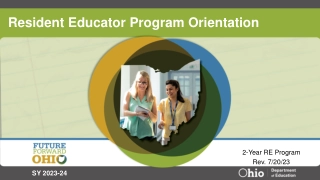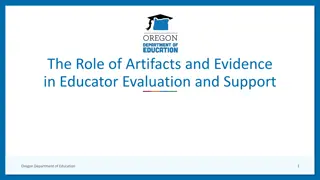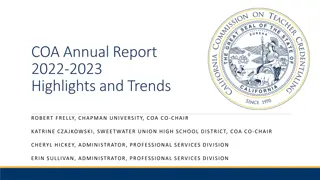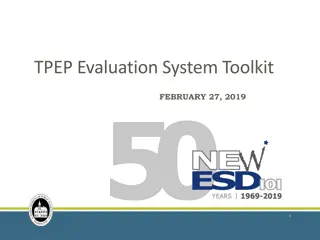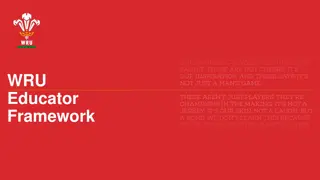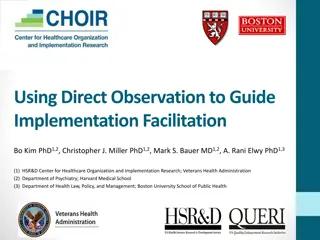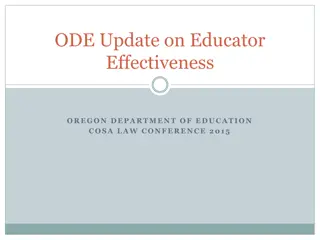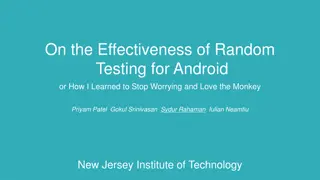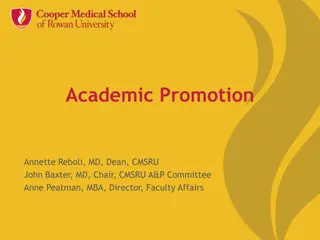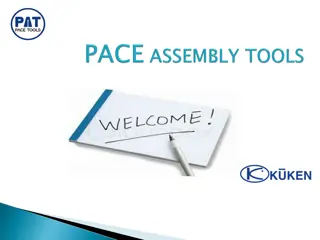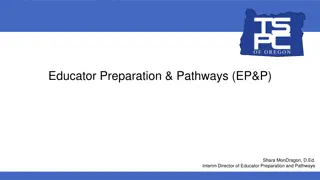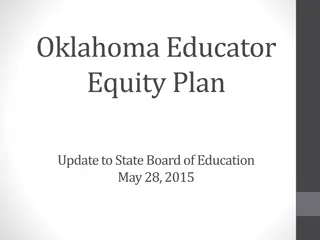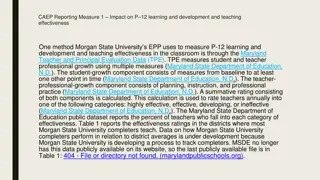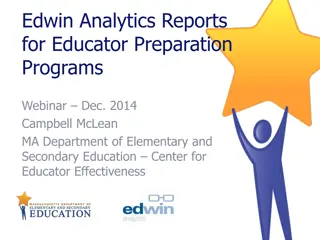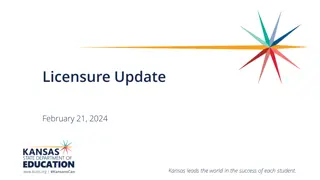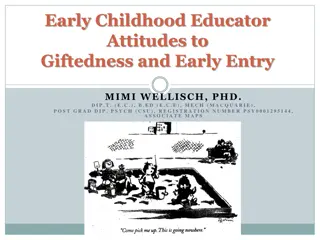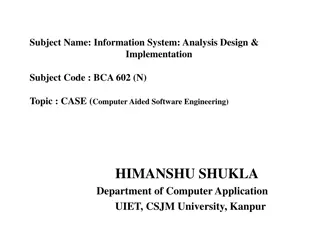Educator Effectiveness & Implementation Tools
The Wisconsin Educator Effectiveness System focuses on improving student education through guided professional growth of educators. Discover the importance of educator effectiveness and how it contributes to student outcomes, leadership, and equity in education.
Download Presentation

Please find below an Image/Link to download the presentation.
The content on the website is provided AS IS for your information and personal use only. It may not be sold, licensed, or shared on other websites without obtaining consent from the author.If you encounter any issues during the download, it is possible that the publisher has removed the file from their server.
You are allowed to download the files provided on this website for personal or commercial use, subject to the condition that they are used lawfully. All files are the property of their respective owners.
The content on the website is provided AS IS for your information and personal use only. It may not be sold, licensed, or shared on other websites without obtaining consent from the author.
E N D
Presentation Transcript
Educator Effectiveness & Implementation Tools Jacob Hollnagel, Education Consultant Licensing, Educator Advancement & Development (LEAD) Team Thursday, March 7, 2024
A Little A Little B Bit it A About bout M Me e Jacob Hollnagel Education Consultant Licensing, Educator Advancement and Development Team jacob.hollnagel@dpi.wi.gov (608) 266-5195 2
Agenda Agenda Wisconsin Educator Effectiveness (EE) System Foundations Tools Supporting EE Implementation Questions 3
Who Are You? Who Are You? What are your roles? Do you currently use Frontline Education for EE? What is your vision for EE in your school or district? How can a data tool help get you there? 4
What is Educator Effectiveness? The Wisconsin Educator Effectiveness System is a learning-centered, continuous improvement system designed to improve the education of all students in the state of Wisconsin by supporting guided, individualized professional growth and development of educators. 5
Why Educator Effectiveness? (1 of 2) 1 Teachers are the most important school-based factor contributing to student outcomes. School Leadership is the second most important school-based factor contributing to student outcomes. 7
Why Educator Effectiveness? (2 of 2) 2 School leaders make that contribution to student achievement through their effects on the school environment, teacher effectiveness, and other factors. Teacher effectiveness is not fixed, can be improved, and school leaders have a role to play in that professional growth. 8
Educational Equity Educational Equity Educational equity means that every student has access to the resources and educational rigor they need at the right moment in their education, across race, gender, ethnicity, language, ability, sexual orientation, family background, and/or family income. WI Department of Public Instruction (2017) Equity: Wisconsin s Model to Inform Culturally Responsive Practices. 9
Five Learning Five Learning- -Centered Principles Centered Principles A foundation of trust that encourages educators to take risks and learn from mistakes A common, research-based framework on effective practice Regular engagement in educator-developed goals (Student/School Learning Objectives and professional practice goals) Cycles of continuous improvement guided by timely, specific feedback Integration with district and school priorities and practices 10
Trust Matters Trust is necessary for effective learning communities. Trusting school cultures encourage risk-taking and learning from mistakes. Trust strengthens professional culture. In schools where professional culture is organized for improvement, improvement is also seen in teacher retention, job satisfaction, and commitment to the school in which they serve. 11
Integration When integrated with other school and district improvement strategies, the EE System becomes the organization improvement system: Goals inform professional learning and vice versa Frameworks guide all professional conversations Hiring, mentoring, and career ladder development are aligned Classroom-school-district goals align and drive growth across the system EE supports other initiatives (curriculum implementation, Universal Design for Learning, professional learning communities, etc.) 12
Data Reports in Frontline Data Reports in Frontline Customizable filters, savable, shareable districtwide or school building reports Report Writer Report Writer text fields Example use cases Rubric Explorer rubric fields Example use cases Growth Explorer dropdown lists, checkboxes Example use case SLO goal review for all teachers in a building or principals in district - trends in standards alignment - goals reflective of baseline data and other data sources What are the 3 Danielson components most self-identified as Areas for Growth by new teachers? - can inform areas for needed support for new teachers (through coaching, mentoring, professional development, etc.) What are some trends in feedback using the critical attributes for "engaging students in learning" (Danielson 3c) during observations of teachers? indicated Focus Areas - evident trends - supports might be put in place for frequently identified areas Which Danielson components are most identified as areas of strength in Professional Conversations? 13
Elements of the System in Practice Elements of the System in Practice (1 of 2) (1 of 2) 1. Observer Certification Training and Calibration 2. Orientation and Ongoing Training 3. Regular Self-Review 4. Educator-Developed Goals 5. Observations, Evidence, and Feedback 6. Regular Conferences 15
Elements of the System in Practice Elements of the System in Practice (2 of 2) (2 of 2) 1. Observer Certification Training and Calibration 2. Orientation and Ongoing Training 3. Regular Self-Review 4. Educator-Developed Goals 5. Observations, Evidence, and Feedback 6. Regular Conferences 16
Supporting System Processes with Tools Supporting System Processes with Tools Frontline Education Employee Evaluation Management (EEM) Platform Google and Microsoft Templates Other, locally-developed options
Supporting System Processes with Tools Supporting System Processes with Tools 2 2 Frontline and Google forms mirror each other
Regular Self-Review Regular engagement in a self-review based on a shared framework of effective practice: Reinforces educator self-efficacy Encourages reflective practice Informs student learning and professional goals 19
Self Self- -Review Review 20
Educator Educator- -Develop Developed Goals ed Goals The development of annual, educator-led student and school learning objectives: Regularly assess and guide instruction Can be thoughtfully aligned to school and district goals, such that the educator can monitor and adjust strategies at the school and classroom level Increase ownership and engagement in the process Focus the work on using adult practices to affect student learning 21
Goal Setting & Review Goal Setting & Review Set, Review, Revise, Assess Success Beginning-of-interval Mid-interval review End-of-Interval Customize requirements & use Information from previous goal forms is pulled and displayed to streamline processes. 22
Observations, Evidence, and Feedback The direct observation of and collection of evidence about educator practice informs feedback: Regular observation and evidence collection ensures accurate evidence Accurate observation and other evidence informs personalized feedback Feedback provides input into the continuous improvement process for student learning and professional practice goals Frequent observation and feedback create stronger relationships between evaluators and educators 23
Regular Conferences Regular Conferences Regular conferences between evaluators and educators creates: Opportunities to provide and receive feedback Opportunities to check-in on student learning and professional practice goals Opportunities to assess effectiveness of prior feedback Regular and more frequent conferences create stronger relationships between evaluators or peers and educators 24
Whats Good Feedback? Opportunities to Use Feedback Useful Feedback Accurate Feedback Based on evidence aligned to common frameworks Evidence be collected by trained observers Utilizes the common language of the framework Identifies specific criteria for improvement Aligned to priorities of the educator based on Self-review SLO Connects to educator s specific context (i.e., classroom or building, personalized goals) Connects the educator with resources Mentors Coaches Professional Learning Communities Professional Development Opportunities Jones, C., Gilman, L. (2019) The Impact of the WI Educator Effectiveness Process on Student Achievement 25 25
Simple, Collaborative Approach Simple, Collaborative Approach What s working? (Validate) What s challenging? (Clarify) What are your next steps? (Stretch & Apply) What support might I provide? What feedback do you have for me? 26
Professional Conversations Log Professional Conversations Log Professional Conversation Log: any conversation, very flexible completion 27
Professional Growth Review Professional Growth Review Professional Growth Portfolio: "one stop shop" of current year's entries This Year's Goals & Focus Displays reports of: Self-review Goal, goals adjustments, uploaded supporting files, end-of-year self- summary on the SLO rubric Professional Conversation Log reports Artifact and observation evidence (sorted by rubric component) Fields to document End-of-Year Summary & Next Year Planning 28
Professional Growth Portfolio Professional Growth Portfolio (1 of 3) (1 of 3) This Year's Goals & Focus Displays Self-Review Goal, Goal adjustments, Uploaded files, End-of-year SLO summary Enter Focus Components 29
Professional Growth Portfolio Professional Growth Portfolio (2 of 3) (2 of 3) Ongoing Evidence Collected Displays Professional Conversation Log reports Artifacts & Observations 30
Professional Growth Portfolio Professional Growth Portfolio (3 of 3) (3 of 3) End-of-Year Summary & Next Year Planning 31
EE Data Collection EE Data Collection (1 of 4) (1 of 4) Districts must retain and be able to provide evidence of the following required EE practices. 32
EE Data Collection EE Data Collection (2 of 4) (2 of 4) Provide WI EE System orientation and training for educators and evaluators. Evaluators certify in the relevant rubric and districts provide ongoing monitoring of inter-rater agreement (aka calibration). Educators complete a self-review during their evaluation cycle. 33
EE Data Collection EE Data Collection (3 of 4) (3 of 4) Educators develop and complete at least one SLO annually. Evaluators conduct required EE conferences, including Planning, Mid-year, and End-of-cycle conferences. Evaluators conduct required observations of professional practice for each evaluation. 34
EE Data Collection EE Data Collection (4 of 4) (4 of 4) Districts using Frontline have EE data collection & compliance taken care of. Districts implementing their own EE management system (e.g., Google Classroom, etc.) or an alternative model must create a data collection management independently. 35
Platform Supports & Resources Platform Supports & Resources DPI Help Center to Support the Frontline Platform) Articles sorted by role WI-specific setup and use guidance Announcements & upcoming training opportunities Request submission Frontline Learning Center (must be logged in to Frontline account to access) 36
Next Steps for EE Next Steps for EE DPI continues to refine and improve EE Recently implemented new flexibilities in 2022 to support educators and overall system improvement Publishing revised guidance and training this summer Expanding on new, robust, and time-saving training for evaluators available this summer Providing Free Professional Development Resources: LinkedIn Learning 37
Resources for Educator Effectiveness DPI Educator Effectiveness webpage Process Guides for Teachers and Principals Required Evaluator of Teachers Training Recommended Training for Principals and Evaluators of Principals Mentoring and Induction Resources Mentoring and Induction Guidebook Mentor Training Coaching and Professional Learning Communities 38
Questions? Questions? Thank you! Thank you! Please scan the QR code to provide us with your feedback!


